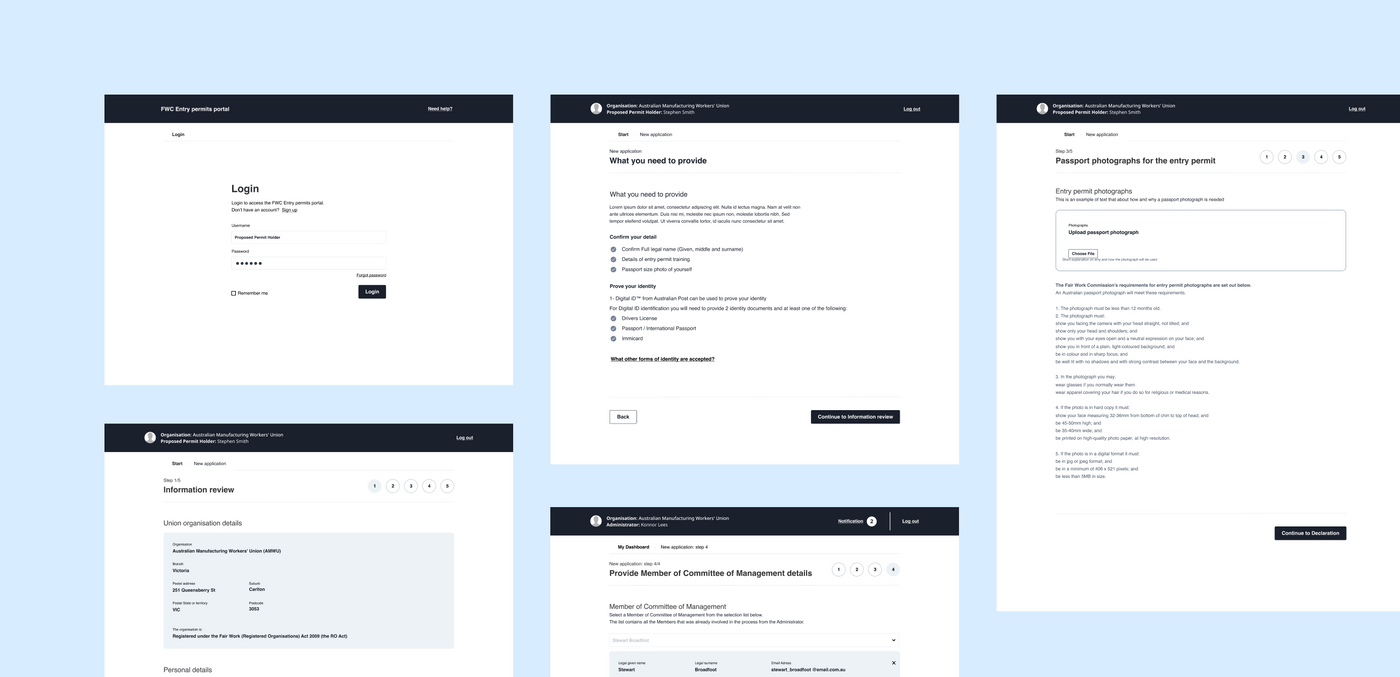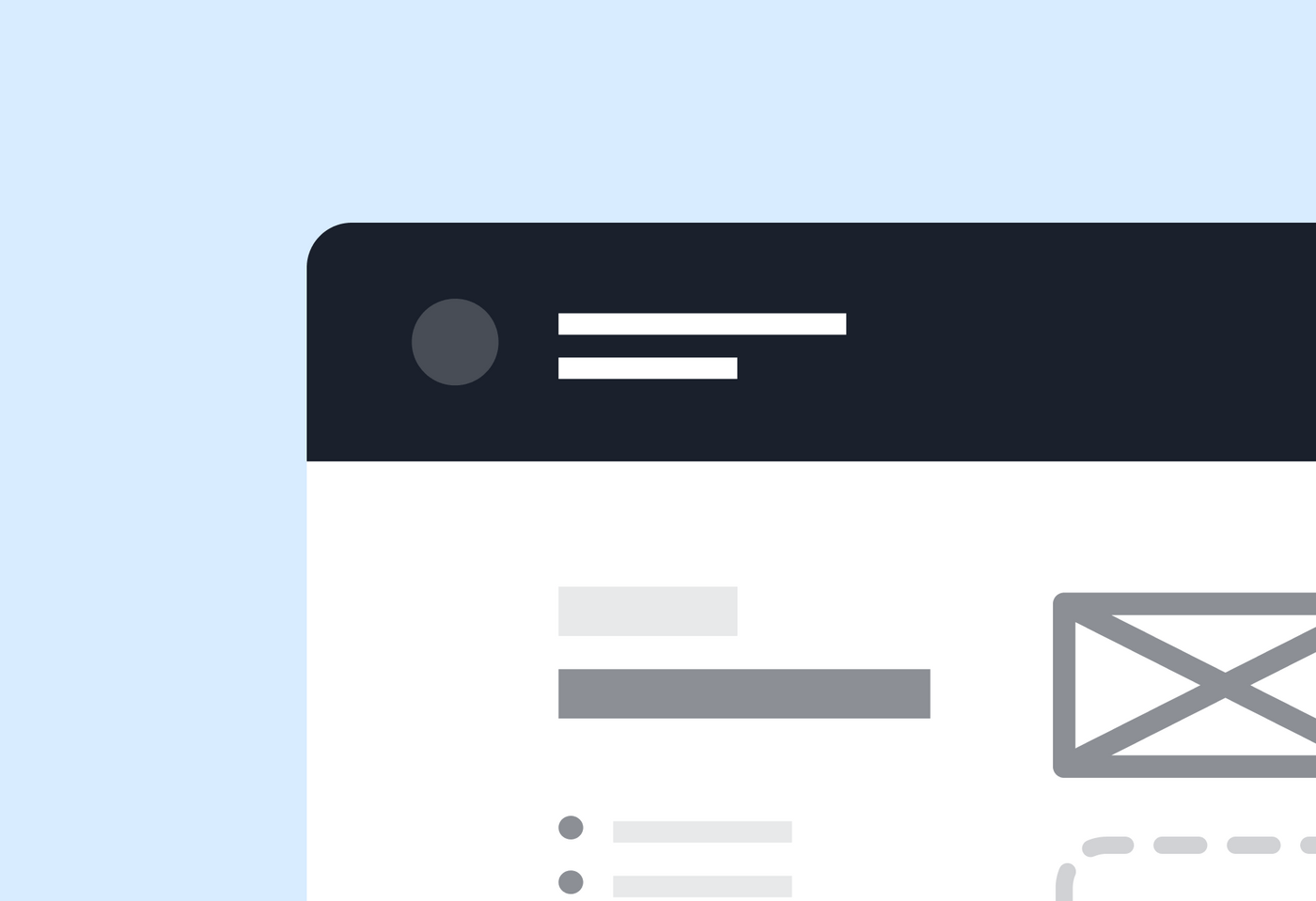The Fair Work Commission is Australia’s national workplace relations tribunal. It was established by the Fair Work Act 2009 (Fair Work Act) and is responsible for administering the provisions of the Fair Work Act.
As part of a push to move older paper based processes to digital experiences, the Fair Work Commission acknowledged that the 'right of entry' process for union officials to lawfully access worksites was a particularly important one with complex requirements to consider across form design, legal requirements, multiple parties and identity verification.
The Fair Work Commission engaged Portable to re-imagine a digital system for 'right of entry' permits. Doing research to better understand the current process and pain points for both union permit applicants and Fair Work Commission staff managing them.
This research formed the foundations of a rapid design, build and testing phase to deliver a working prototype of the re-imagined permit application process.

The Opportunity
At any one time, there are 4,500 right of entry permits in circulation. Each permit lasts for 3 years and is provided to people working within 100 unions. The Commission recognised inefficiencies in the current process. For example, people need to fill in the form as well as get verified through DigitalID – so it involves two separate forms (42 and 42C). This causes a lag as this process requires two bits of paperwork - one in the form itself and then getting the ID verified.
More broadly, the Commission is rolling out a new Case Management System and this work aligns with the need for smart forms, better integration with DigitalID and making the process in general more efficient so that users experience fewer barriers in the process.
The Commission was interested in envisioning what a new service would look like that is digital-first. This includes developing a prototype of the process that is more efficient and less duplicative and testing with both those in the Commission and union representatives.
Moving from paper based processes to digital applications also required a review of technical considerations for future implementations to make sure that the prototype could work in the technical ecosystem long term. As well as a review of how DigitalID could assist and make the process in general more efficient so that users and the Fair Work Commission experience fewer barriers in the process.
Our Approach
Portable and the Fair Work Commission followed an agile, human-centred design approach across eight, 1-week sprints.
We conducted internal interviews with Fair Work Commission staff and a discovery workshop with unions to better understand the pain points and inform the creation of a live proof of concept that could be tested and refined.
1. Understanding the current state
The initial workshop was an opportunity to better understand the context of the entry permits process and capture our research assumption about Fair Work Commission internal staff, union administrators, entry permit process users and the current state of the entry permits process.
The internal interviews allowed us to map the current state entry permits process from the perspective of Fair Work Commission staff directly and indirectly involved in the process. We were able to understand the context behind why and how the process is structured, current pain points and priority improvements for staff.
The workshop with union administrators responsible for managing their union's entry permits process allowed us to map their interactions with all involved in the application, what their process was and identify pain points they experienced. This allowed us to prioritise the main insights and collaboratively map an ideal process from the point of view of union admin staff.
2. Uncovering the pain points
Pain points across Fair Work Commission staff and unions were consolidated and prioritised according to impact and importance. Some of the main paint points included:
- Excessive back and forth communication between parties involved in an application delaying the process.
- Errors when submitting forms including misspelt names or missing information causing the Fair Work Commission to have to go back to the unions, again delaying the process.
- Lack of a single form process to prepare and submit applications more efficiently.
3. Mapping the future state
Once key pain points had been prioritised we began the process of mapping a re-imagined entry permits process.
This map assisted with selecting key user flows that would be designed into low fidelity wireframes and then further developed into interactive prototypes of a centralised dashboard and forms experience for users.
4. Iterative digital development
Portable's multidisciplinary team of designers and developers worked together to design and build a live prototype built in code (known as an alpha prototype) as a way to not only test and iterate the way the prototype looked to a user, but how it functioned in the backend.
Using Portable's UI toolkit allowed for a faster build and for iterations to be easily made on the front end, this combination of designing and developing an alpha prototype allowed for a deeper range of insights across form and function.
5. User testing
The prototype was presented to subject matter experts at the Fair Work Commission to gather more information and nuance around legal requirements, as well as a round of user testing with union administrators.
Throughout the design process the technical feasibility of the prototype was constantly reviewed as the alpha prototype was developed to collate recommendations for future designs and features.

Outcomes
The outcome of this project was a working, alpha prototype that included:
- A dashboard for union members to easily manage and submit 'right of entry' applications. The dashboard is designed to show a live status of each application a union is managing, whilst also allowing them to manage the applications themselves.
- Re-designed forms that let union applicants and signatories understand what is expected of them in advance using best practice experience design to automatically fill relevant information or pick up where an error has occurred to reduce the load on applicants and Fair Work Commission.
These improvements are designed to reduce the length of time an application takes to be approved by avoiding errors, provide a better experience for union applicants so they are able to navigate the process with ease by knowing what is expected of them and reduce additional work for Fair Work Commission staff.
As part of delivering the prototype, Portable worked with the Fair Work Commission to scope and understand long term technical recommendations for a future build phase.
As the prototype was not only designed but also developed as an interactive alpha, we were able to understand and mitigate longer term development implementation challenges.
We also assessed future features and feasibility and provided a roadmap of recommendations using user stories. This gave the Commission a clear pathway forward to scale up and roll out the new digital entry permits process.
Team
- Libby de Souza, Senior Digital Producer
- Greg Corlett, Senior Technical Business Analyst
- Matthew Dalla Rosa, Senior User Experience Researcher
- Cristiano Fantasia, Senior Experience Designer
- Cam Stark, Developer